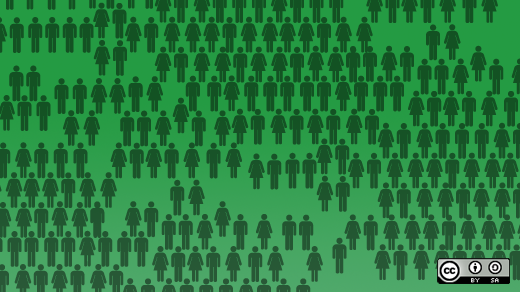Is there such a thing as the open source community?
A related question was covered here before, about whether the word community means anything anymore. But, I still see the term “the open source community” regularly lobbed.
Here on opensource.com a search turns up 61 articles. [Some were for the term “open source communities”—different altogether, but only a handful.] Most of the time, there’s no further clarification. I’m sure I’ve been guilty in other writings.
What good does invoking the term do? Does it obfuscate, does it promise something that doesn’t exist and only serves to mislead ourselves and outsiders even more? Who counts as an outsider and who gets to decide?
Foreign Policy had the same debate [log-in required] in 2002 about the phrase “the international community.” They invited a set of practitioners, scholars, and journalists to weigh-in. Although they were thinking in terms of a world filled with sovereign nations, international institutions, and treaties, the debate has some striking parallels.
Let’s start with the negative crowd.
“This feel-good phrase evokes a benevolent, omniscient entity that makes decisions and takes action for the benefit of all countries and peoples. But invoking the international community is a lot easier than defining it.”
Andrew Gowers, former editor of the Financial Times, wrote that and then pointed out that the publication went so far as to ban the phrase’s use from editorial columns.
It’s pat-on-the-back good, but has no point of central gravity or agency: “...the phrase makes it easy to avoid hard thinking about who might act, out of what motive, and to what effect.”
Sadako Ogata, former UN High Commissioner for Refugees, also sees it as “amorphous both conceptually and in practice” and avoids using the phrase. She observed in her position that this “community” formed and retreated depending on the nature of the crisis and how much media coverage the crisis received.
“The international community did not seem to exist even in the face of human tragedies. Ultimately [it] does exist, but only as a potential source of power...”
It takes something big, and easy to agree on in a sense, for the community to take shape.
Eric Raymond was quoted in 1999, referring to Apple releasing source code: “The open source community is delighted about this announcement.”
I’m not sure when the poll was done. Luckily, that topic is a gimme, but that’s the point. When the issue becomes less clear cut, we appear much less in terms of community and more as warring tribes.
Of course, if anyone can represent the open source community, Raymond is on the short-list.
Which leads into a major component of the debate: elites.
Noam Chomsky, positive Noam as always, equates the international community as really just the United States and its interests, making it impossible for the country to be at odds or in disagreement with “the international community.”
Are their players out there that say they represent open source, companies and people that ride coattails—those that behave as what they say and do is always the interest of the open source community?
Walden Bello, a professor in the Philippines, wrote in terms of the international community represented at Davos and the World Economic Forum, and the other international community at the lesser-known World Social Forum, a self-proclaimed alternative-development-path conference often held at the same time. Both of course, say they represent the international community.
When you’re trying to pick which events to go to year after year, there’s no doubt a voice questioning which ones are more legitimate than others.
Ruth Wedgwood, a professor and member of the UN Human Rights Committee, takes the prize for invective:
“‘International community’ is a dangerous reference point for the naive. The concept amounts to a moral hazard, inspiring imprudent behavior by leaders who expect that someone else will pull their fat out of the fire.”
Now, we’re not talking about nuclear proliferation, famines, or tsunamis when it comes to thinking about “the open source community.” But, it does bear thinking on who are the free-riders, who are the detractors, and who gets others into trouble.
She continued: “The lawless scoff at an international community whose words have no supporting cannon fire.” Similarly, the open source community can tweet, flame, and blog all day long. But, it can’t sanction, fine, bomb, so on. This is probably a good thing.
Potentially, it also means others may be thinking, ‘so what if I defy the open source community, it’s not like they can do anything.’ And yet, we do have analogues to enforcement in the Free Software Foundation, Software Freedom Law Center, Open Source Initiative, and so on. If the strength of this community is defined by how it can deter and punish those that don’t follow its law and spirit, these groups and leaders are existentially important.
Let’s get a little more positive.
Kofi Annan, UN Secretary-General at the time, demonstrates the phrase, ‘where you sit is where you stand’ still holds.
“It is high time we gave more concrete meaning to the idea of the international community.” To do that, he wanted to see more mature “institutions and mechanisms.”
I’m not seeing formal decision making bodies, like a UN for open source, anytime soon; however, more and more, groups like Open Source for America pop up.
J. Bryan Hehir, professor and president at the time of Catholic Charities USA, takes a slightly different approach. Questions like ‘does it exist’ “miss the point.” In his view it “doesn’t exist at all.” Rather, it’s “valid primarily as a moral concept that in turn can shape institutions and inform policy choices.”
Arjun Appadura, a professor, agreed: “The international community is neither international nor a community. Yet there is something compellingly real about this misnamed object. That reality lies in its moral promise.”
Maybe when we use the term open source community, it’s not physical people in a sense but the ideas, sentiments, and principles of open source. It’s not meant to be something that acts, something that makes decisions, or something that can be spoken for, but rather a promise.
Just even asking what this fictitious community might think or do gets us somewhere. Kind of along the lines of wearing a bracelet that says “What Would Chuck Norris Do?”
If we held a similar debate, would you align with any of these thinkers?

Opensource.com
What to read next






Comments are closed.